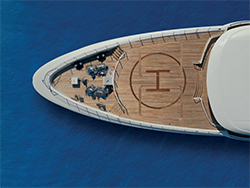 With tax harmonisation well on its way, where does that leave the Channel Islands – a jurisdiction that has built its success on a suite of tax-neutral products? For the super-wealthy, certainty and reputation trump low taxes
With tax harmonisation well on its way, where does that leave the Channel Islands – a jurisdiction that has built its success on a suite of tax-neutral products? For the super-wealthy, certainty and reputation trump low taxes
As Jersey and Guernsey have matured and evolved as international finance centres, tax planning has become less important to clients – they are placing greater value on the stability and experience that the islands’ service providers can offer.
And that will be welcome relief to the jurisdiction, as tax harmonisation threatens to erode the advantage of regions that have staked their chips on being tax havens.
While facing the challenges of the rising costs of regulation and compliance alongside a declining workforce, the industry is confident that it can stay accessible and relevant to future generations of families and entrepreneurs seeking a safe harbour to protect and enhance their wealth.
Despite tax harmonisation, practitioners believe that there are numerous reasons why the islands will remain the go-to centres for the wealthy.
For Ian Rumens, Head of Private Client at Ocorian in Jersey, reputation is everything. “Clients who come to see us today are looking for an investment platform that provides a solid governance framework through which they can invest to enhance their wealth in a compliant, sustainable and ethical way,” he says.
“The distinction these days between onshore, offshore and midshore has blurred. People are looking for a cocktail of all three to achieve a return on investments.”
Eye-watering income
“Tech entrepreneurs are making an eye-watering amount of money and ESG and reputation are very important for these new clients, for example,” Rumens adds. “They are not focused on minimising paying tax if they are making good returns.”
Robert Moore, UK Director at Jersey Finance, agrees. “There’s strong evidence that tax mitigation among private clients and families is less of a driver in terms of structuring now than it used to be.
“In our Asia’s Great Wealth Transfer white paper, 86% of advisers to families in Asia said that wealth preservation and the maintenance of family harmony were the two key objectives for wealthy families in organising more structured legacy and succession planning. Tax mitigation ranked low on their priorities,” he adds.
“The concept of tax neutrality is simple: by not imposing additional layers of tax, decisions can be made on their economic merits alone. Tax continues to be paid by the beneficial owners in their home jurisdiction and, where applicable, by the underlying investment in its home jurisdiction.
“So, the use of a tax-neutral international finance centre such as the Channel Islands should result in no more or less tax being payable.”
Shifting landscape
Sarajane Kempster, Director of RBC Wealth Management’s fiduciary specialist team, can also see positives in the shifting landscape.
“What it will mean is the removal of the jurisdictional tax arbitrage we currently have over where clients wish to base their affairs, to be replaced by more of a level playing field – and the Channel Islands is better positioned in that regard,” she says.
“The future looks bright for the islands and we will come out as jurisdictions of choice. Our professional services industry has a history of reinventing itself and adapting to changing legislative and regulatory environments.”
Compliance’s fine line
A further challenging factor pushing up the cost of servicing wealthy clients is compliance – something of a curate’s egg for the industry.
Paul Carney, Client Services Director at FCM, says: “Compliance is a standard part of the cost of doing business in any sector. In the context of the islands’ financial services sector, this is also part of the substance required and increasingly understood by our high-net-worth families.
“However, it’s key for the regulator to keep things as simple as possible. It would be useful to road-test technology changes with end users over a period of time before implementing them.
“The regulator and government have worked well to develop representation with industry bodies. However, the best understanding of, and access to, information is inevitably within industry.
"Perhaps a stronger commitment to secondments into the regulator, similar to the Jersey Finance secondees, would be beneficial in the future.”
 Rumens is pragmatic about the role of compliance in financial services. “The compliance and regulatory environment in which we live is ‘business as usual’ – it doesn’t make much difference whether you are onshore or offshore. All international finance centres have to adhere to the same level of standards.”
Rumens is pragmatic about the role of compliance in financial services. “The compliance and regulatory environment in which we live is ‘business as usual’ – it doesn’t make much difference whether you are onshore or offshore. All international finance centres have to adhere to the same level of standards.”
However, Kempster cautions that compliance must be kept in check. “We must ensure it doesn’t get out of control and rise to the degree where it’s a huge barrier of entry to coming to the Channel lslands,” she says.
“It’s a fine line. We want to be gold standard jurisdictions and that comes with an associated cost. I wouldn’t like to see ourselves priced out of the private wealth industry.”
There’s a consensus that the smart use of technology and innovation will offset the impact of compliance.
This has led to the emergence of high-quality, industry-standard off-the-shelf packages that have streamlined the process to some extent.
And it is technology and digital systems that are seen as a key factor that will continue to attract the growing number of high-net-worth families and entrepreneurs to the Channel Islands as a base for managing their wealth.
It’s been widely reported that the world’s 10 richest people doubled their wealth during the pandemic and that in 2021, the 500 wealthiest added more than $1trn to their combined fortunes.
The Knight Frank Wealth Report also stated that the number of high-net-worth individuals globally grew by 9.3% between 2020 and 2021.
There’s been a significant growth in family offices in recent years and there’s an ongoing explosion of new wealth in the tech entrepreneurial space.
To continue to attract high-net-worth clients, says Rumens, the islands must adapt to their requirements. He cites the islands’ private fund regimes as being beneficiaries of the change to the way in which wealthy families manage their assets.
“There’s a huge amount of money held by a small percentage of the world’s population,” he says.
“Many of these individuals have established professional family offices with people who have come out of industry – generally big American investment banks – who have moved away from traditional trust structures in favour of using more quasi-corporate and institutional vehicles such as the Jersey Private Fund.”
Investment battleground
Rumens continues: “The new battleground for offshore service providers and the wealth management industry is going to be the client’s digital experience.
“That’s one of the key areas that the younger generation and tech-savvy will be drawn to. The digital interface still needs to be backed up by first-class, quality client services if you are going to remain relevant in the long term.”
Carney believes the islands need to maintain visibility in the right circles – with trusted advisers and those who influence entrepreneurs. They must also stick to simplistic tax rules and remain technologically agile.
“It’s important to keep up the investment in technology. High-net-worth families expect that and it moves and changes at an increasing pace.
“Another point is being able to adapt products – we want to keep them relatively simple. If rules change in other countries, monitor it – don’t rush in to adapt but be ready to adapt,” he says.
Having the right people in place is also important, according to Kempster. “What we need to do is invest in our people and skill or upskill the workforce. Across both the islands, there needs to be a dialogue between industry, government and regulator as to how the industry resources itself.
“We need to ensure that our younger people come back to the islands once qualified. Lifestyle plays a part, but it’s about making the industry attractive in the same way that the tech and investment industry are attractive for the younger qualified population.
“Engagement with our industry representatives is key in terms of making sure that the population of qualified people know what’s available in the industry, see it as attractive to work in and that they can have a sophisticated career in the Channel Islands not too dissimilar to London.”
Tracking talent
Rumens adds that employer flexibility and innovative working practices will play a part in ensuring the islands maximise their available talent.
There’s a view that, as long as a balanced approach to regulation and compliance and investment in digital solutions and human resources are in place, there is every reason for the islands’ industry to survive and continue to grow.
Carney says: “There’s an increasing desire towards family offices at the higher end of the wealth spectrum and there will be another level, where there is a good market, just below family offices.
“Having a range of service providers is going to be useful. The cost of running a family office may be prohibitive to certain clients, but if they can get an independent to look after them providing a bespoke service that’s agile, there will be a continued demand for that.”
There’s plenty to play for, says Kempster, “There will be fewer new private wealth structures around, but they will be of higher value, more complex. We need a professional workforce that can deal with that kind of work – that’s the key to survival.
“We have extremely high standards of legal firms and tax advisory practices in the Channel Islands and gold-star fiduciary service providers.”
Moore concludes: “HNWI clients seek certainty – tax is no longer the unique driver. They want assurance that their interests remain safe and Jersey positions itself well with a strong track record and recognised reputation as an international finance centre of excellence.”